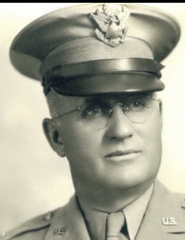Buddies recall Experiences In Europe; Await Trip Home
By Frank Miles
(Daily Times Herald War Correspondent)
Paris, France (IDPA) -- Lieutenants Richard Spencer, Des Moines and E.J. Pinkston, Council Bluffs, got hot from throwing cold water on each other while taking shower baths at the ATO fraternity house at the University of Iowa, tussled and then became fast friends. Soon after the United States was forced into World War II, they decided to be paratroopers and joined the army together.
They were commissioned at the same time after finishing a course at the officers candidate school at Fort Benning, Ga., took special training at the same class at Taccoa, Ga., and were assigned to the 517th parachute infantry regiment. Attached to the 36th division, they landed at Naples, fought in Italy, entered France when Americans forces attacked Marseilles and nearby places in August 1944.
At St. Nazaire a German mortar shell exploded close to Spencer, blowing him over a stone fence to come down at the feet of Pinkston. Spencer was bleeding profusely but was dazed and didn't realize he was hurt until his pal repeatedly told him while administering first aid. Pinkston was wounded soon afterward by a piece of a flying Jerry steel.
They went northeast through France and into Belgium, where they were in the Battle of the Bulge, then fought in Germany. I met them in Paris, a happy pair because they thought they were going home before being ordered to the Pacific. Each wore four Battle Stars, the Purple Heart and the Combat Infantryman's badge.
"Those Iowans are real fighters and great guys," said a Michigan officer who had been with them over a long period.
"I want you to meet one of the most interesting and cooperative officers I know," a noted magazine writer said to me.
"Lieutenant Colonel Henry C. Walsh."
We shook hands.
"And where are you from in the States?" I inquired.
"Burlington, Iowa."
We shook hands again.
Colonel Walsh was promoted from major the day we met. He was in the prisoner of war division of the provost marshal's section of the European theater, and had been overseas since June 22, 1942.
"Most of the Germans in our hands have been submissive enough but the SSers are always arrogant," he said. "Yes, I believe our government should have a firm policy in dealing with their country. Germany must not be allowed to plunge the world into another war."
Born in Clinton, Colonel Walsh attended Harvard, Yale and Iowa universities. He practiced law in Burlington before entering the army on his reserve officer's commission. He expects to resume his profession there after returning to inactive duty, and will come home with a wife, an English girl to whom he was married in November of 1943.
A young GI, who was captured by the Germans in Africa after a furious fight and had spent 27 months in prison camps, showed me a letter from his wife., the mother of his child he had never seen, in which she asked him to let her to divorce him. She said that in the year they had lived together he had been a good husband but during his absences she had found she loved another man, a 35-year-old civilian, who had made a lot of money.
"I'll not try to hold her if she wants to leave me, but I'll not let them have my baby," he said huskily, wiping tears from his eyes.
Source: Carroll Daily Times Herald, July 10, 1945
![]()

